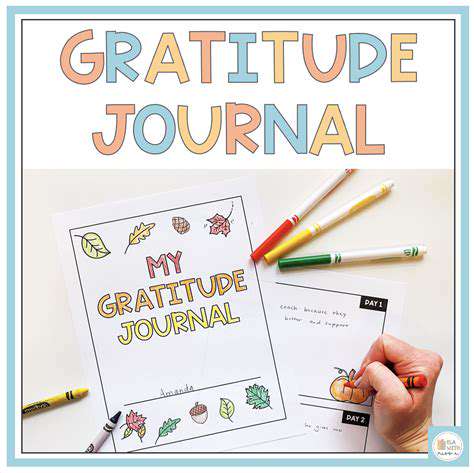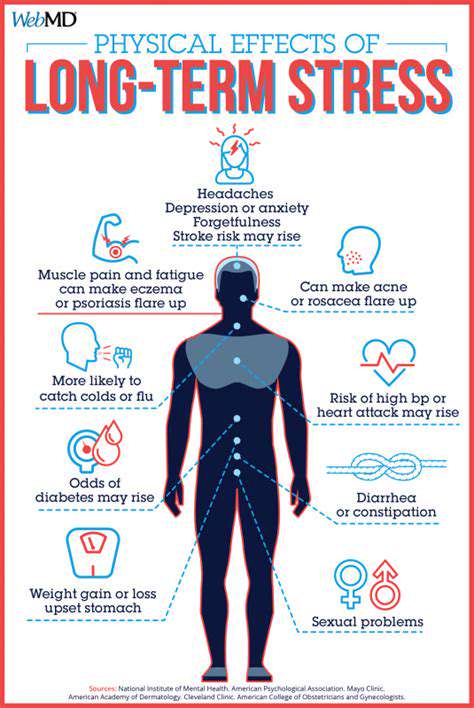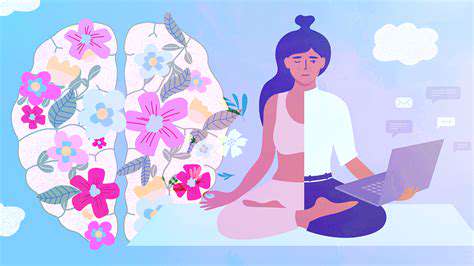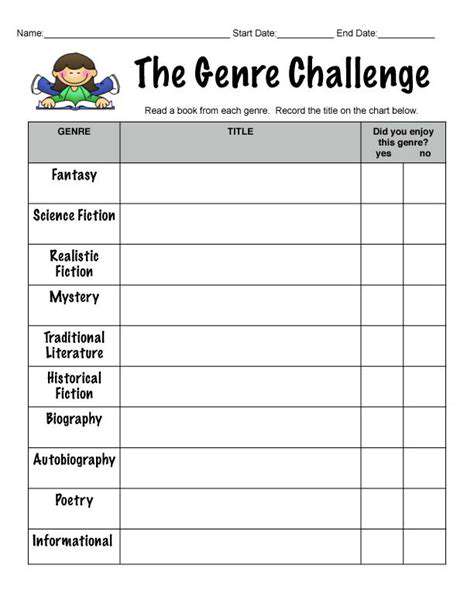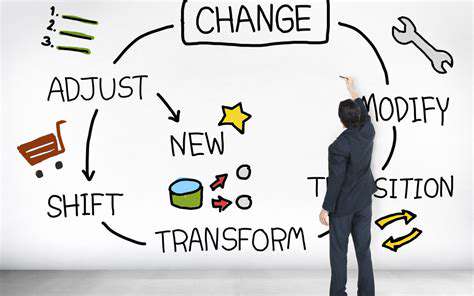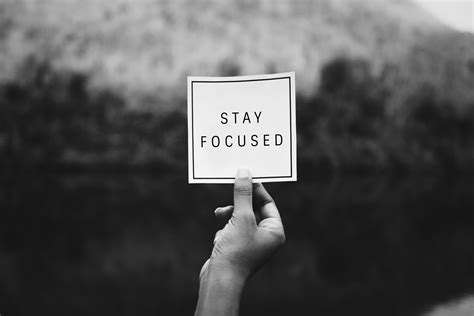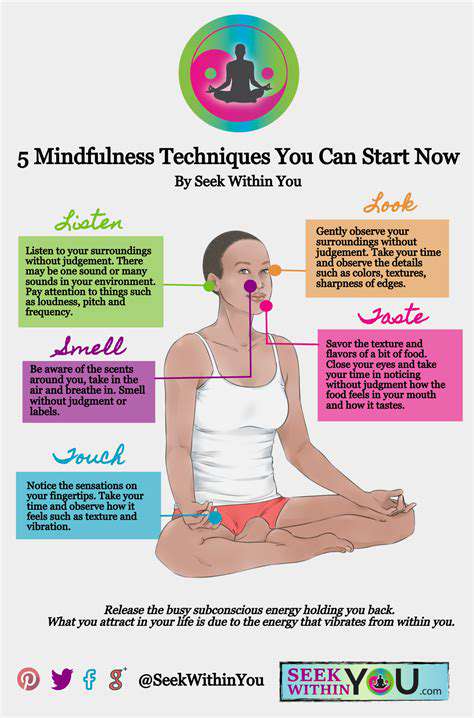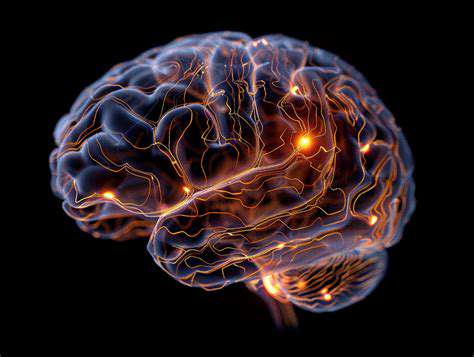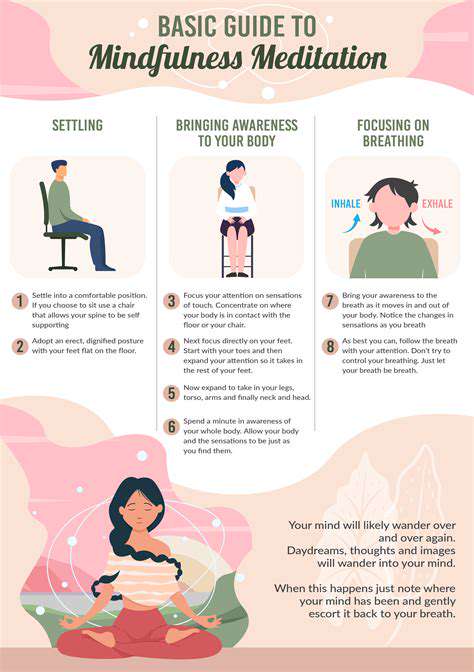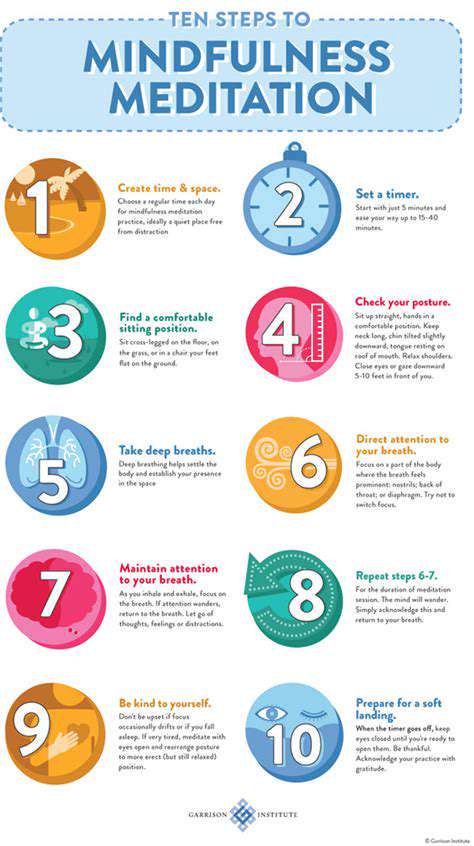A Comprehensive Guide to Mindfulness Meditation Techniques
What is Mindfulness Meditation?
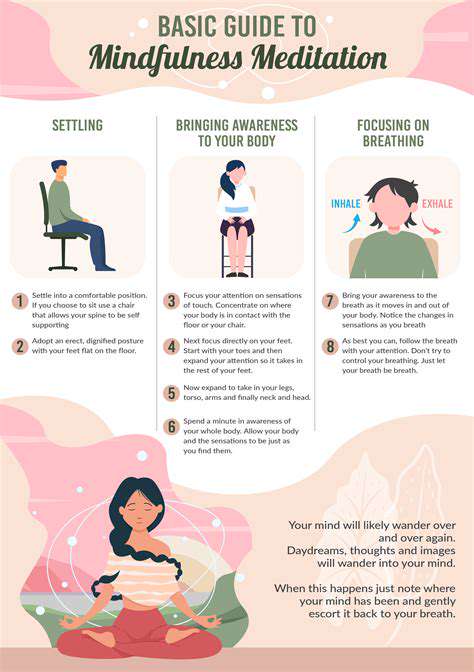
Understanding the Basics of Mindfulness Meditation
Mindfulness meditation is a mental practice that encourages an enhanced awareness of the present moment. It emphasizes observing thoughts and feelings without judgment, fostering a deeper connection with oneself.
By practicing mindfulness, individuals can learn to recognize the autopilot mode that often dominates their lives. This awareness helps break the cycle of stress and anxiety.
The Benefits of Mindfulness Meditation
Research has shown that mindfulness meditation can lead to a variety of mental and physical health benefits. These include reduced stress levels, improved emotional regulation, and even lower blood pressure.
Moreover, the practice cultivates a sense of inner peace and promotes greater clarity of thought. Regular engagement in mindfulness can transform one's overall well-being.
Different Techniques in Mindfulness Meditation
There are several techniques that individuals can use to practice mindfulness meditation, including breath awareness, body scan, and loving-kindness meditation. Each technique has its unique focus, making it adaptable to personal preferences.
For instance, breath awareness involves concentrating solely on the breath, noticing each inhale and exhale. This practice not only grounds individuals but also enhances their ability to stay present.
Creating a Mindfulness Meditation Practice
Establishing a consistent mindfulness meditation practice is crucial for reaping its benefits. Set aside a specific time each day, even if it's just for a few minutes, to engage in meditation.
Additionally, creating a calming environment can enhance the experience, allowing for deeper concentration. Over time, this dedication can lead to profound changes in your mindset.
The Key Techniques of Mindfulness Meditation
Understanding Mindfulness Meditation
Mindfulness meditation is a practice rooted in ancient traditions, particularly within Buddhist teachings. It emphasizes awareness of the present moment, helping individuals cultivate a deeper connection with their thoughts, feelings, and surroundings.
This technique encourages practitioners to observe their experiences without judgment, promoting a sense of acceptance and clarity. Through mindfulness meditation, individuals learn to detach from the constant chatter of the mind, allowing them to experience peace and tranquility.
Combining sweeping awareness with focused attention, mindfulness meditation can enhance emotional regulation and improve overall well-being. It empowers practitioners to recognize patterns in their thoughts and behaviors, leading to increased self-awareness.
Whether a beginner or seasoned practitioner, understanding the core principles of mindfulness meditation can lay the foundation for effective practice. Establishing a regular routine can amplify the benefits and foster a more profound commitment to mindfulness in daily life.
Incorporating mindfulness into everyday activities, such as eating or walking, can further enrich the meditation experience, making it accessible and practical beyond traditional sessions.
Key Techniques for Practicing Mindfulness
One of the fundamental techniques of mindfulness meditation involves focusing on one's breath. Practitioners are encouraged to observe their breathing patterns, acknowledging each inhale and exhale without trying to change them. This practice can anchor the mind, acting as a focal point amid distractions.
Another popular technique is the body scan, where individuals mentally progress through different body parts, observing any sensations, tensions, or disabilities. This method fosters a connection with the physical body, promoting relaxation and awareness of how emotions manifest physically.
Mindful observation of thoughts is a key element in mindfulness practices. Here, practitioners are taught to acknowledge thoughts as they arise, viewing them as fleeting rather than absolute truths. This detachment helps reduce rumination and stress.
Walking meditation is another effective technique. This practice involves being fully present while walking, focusing on the sensations of the feet touching the ground and the rhythm of movement. It's a wonderful way to integrate mindfulness into physical activity.
Journaling can complement mindfulness meditation. By expressing thoughts and feelings on paper, individuals can gain insight into their mental patterns and emotions, further enhancing their mindfulness practice.
The Benefits of Mindfulness Meditation
Practicing mindfulness meditation has been shown to reduce stress significantly. Research indicates that consistent meditation can lower levels of cortisol, the stress hormone, leading to improved mental health outcomes.
Additionally, mindfulness meditation can improve emotional regulation. By fostering a deeper understanding of one’s emotions, practitioners can respond to stressors more calmly and thoughtfully, rather than reacting impulsively.
Regular mindfulness practice can enhance focus and concentration. As the mind learns to remain anchored to the present moment, distractions become less overwhelming, enabling individuals to devote their full attention to tasks at hand.
Improving overall well-being is another key benefit. Many practitioners report increased feelings of happiness and satisfaction, as mindfulness fosters a greater appreciation for life's simple moments and experiences.
Moreover, mindfulness meditation can promote physical health. Studies suggest that it can support a healthier immune system and contribute to better sleep patterns, which are essential for overall wellness.
Incorporating Mindfulness into Daily Life
Integrating mindfulness into everyday routines can be transformative. Simple practices, such as mindful eating, encourage individuals to savor each bite, recognizing flavors and textures, thus fostering gratitude and satisfaction.
Practicing mindfulness during routine activities, such as brushing teeth or washing dishes, can also deepen awareness. Focusing solely on the sensations and actions of these tasks can bring about a calm, centered state of mind.
Mindfulness can be woven into family interactions, allowing individuals to be fully present with loved ones. By cultivating attentive listening and open communication, relationships can become more fulfilling and connected.
Setting aside time for mindful movement, such as yoga or tai chi, is another excellent way to incorporate mindfulness. These practices combine physical activity with awareness, promoting both mental and physical health.
Lastly, dedicating a specific space and time for meditation in daily life can reinforce the habit. Creating a calming environment invites mindfulness practice and nurtures a tranquil mindset throughout the day.
The Benefits of Mindfulness Meditation
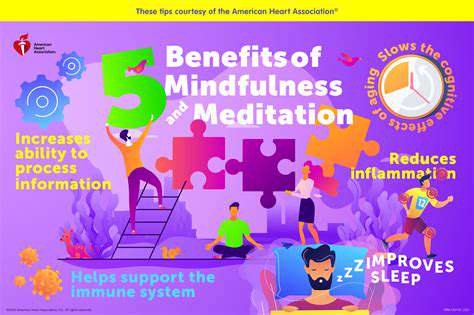
The Psychological Benefits
Mindfulness meditation has been shown to significantly reduce symptoms of anxiety and depression. This practice encourages individuals to observe their thoughts without judgment, promoting a healthier mindset. By fostering an attitude of acceptance, practitioners experience a decrease in overthinking and rumination. This shift in perspective can lead to improved emotional regulation and resilience.
Several studies indicate that regular engagement in mindfulness meditation can enhance overall mental clarity. Individuals often report increased focus and attention span, making it easier to navigate daily challenges. As a result, mindfulness serves as a valuable tool in managing stress levels effectively.
Furthermore, mindfulness meditation facilitates a deeper understanding of one's thoughts and feelings. This self-awareness allows practitioners to identify triggers for negative emotions. By recognizing these triggers, individuals can develop healthier coping strategies.
Lastly, mindfulness meditation supports improved interpersonal relationships. With greater emotional awareness, individuals often communicate more effectively and foster meaningful connections. As such, it can positively impact both personal and professional interactions.
The Physical Benefits
Engaging in mindfulness meditation can lead to various physical wellness outcomes. Research suggests that this technique may help lower blood pressure and improve heart health. This reduction in stress-related physical ailments is an essential aspect of overall health improvement.
Further, mindfulness meditation has been linked to improved immune function. By promoting relaxation and reducing stress hormones, practitioners can enjoy a more robust immune response. It's a powerful reminder of the mind-body connection.
Additionally, mindfulness can contribute to better sleep quality. Many individuals struggle with sleep disturbances due to racing thoughts, but mindfulness practices can create a calming pre-sleep routine. This, in turn, aids in falling asleep faster and experiencing deeper rest.
Finally, those who practice mindfulness regularly often report reduced physical discomfort and pain perception. Through greater awareness of bodily sensations, individuals can cultivate a healthier relationship with their physical selves. Ultimately, this can lead to improved overall well-being and quality of life.
Techniques for Practicing Mindfulness
There are various techniques that individuals can utilize to incorporate mindfulness meditation into their daily routines. One popular method is focused breathing, where practitioners concentrate solely on their breath and the sensations that accompany it. This technique can be performed for just a few minutes but can offer substantial benefits.
Body scans are another useful technique, encouraging participants to connect with their physical selves. Through this practice, individuals methodically focus on different body parts, promoting awareness and relaxation. This helps in releasing tension often held in various areas.
Mindful walking is also an effective way to practice mindfulness in motion. As individuals walk, they can focus on the sensations of their feet touching the ground or the rhythm of their breath. This movement-based mindfulness can be particularly soothing and restorative.
Finally, guided meditations can enhance the mindfulness experience for many. These sessions, often led by experienced practitioners through audio or applications, provide structure and direction. This can be especially beneficial for those new to mindfulness meditation as they learn to navigate their thoughts.
Common Misconceptions About Mindfulness
One prevalent misconception is that mindfulness meditation requires completely emptying the mind. However, the essence of mindfulness is not to suppress thoughts but to acknowledge and observe them without attachment. This understanding can free practitioners from the pressure of trying to achieve silence.
Another common myth is that mindfulness meditation is solely for relaxation. While calming the mind is a benefit, mindfulness also encourages engagement with the present moment, emotions, and experiences. It's not merely an escape but a deeper discovery of one's self.
Moreover, some believe that mindfulness meditation should be practiced for extended periods to be beneficial. In reality, even short sessions of just a few minutes can provide significant advantages. Consistency is often more important than duration when it comes to establishing a practice.
Lastly, people often assume that mindfulness is a quick fix for stress or anxiety. While it can be effective, cultivating a mindful approach to life is a gradual process that requires patience and dedication. The journey towards mindfulness can lead to profound changes over time.
Integrating Mindfulness into Daily Life
Integrating mindfulness into everyday activities can transform mundane routines. One simple way is to practice mindfulness while eating, focusing on the texture, flavors, and aromas of food. This not only enhances the dining experience but also promotes healthier eating habits.
An effective method is to incorporate mindfulness into daily chores. Tasks like washing dishes or cleaning can serve as opportunities for mindfulness practice. By paying attention to the motions of these activities, individuals can cultivate a sense of presence.
Furthermore, utilizing mindfulness techniques during moments of stress can help manage emotions effectively. When faced with challenging situations, taking a moment to breathe and focus on the present can dramatically alter one's response. This can lead to clearer thinking and better decision-making.
Lastly, setting aside dedicated time for mindfulness practice, even if short, can be instrumental. Creating a daily routine that includes meditation, breathing exercises, or simply sitting in silence can reinforce the habit. Over time, these practices can significantly enrich one's quality of life.
How to Start Practicing Mindfulness Meditation
Understanding the Basics of Mindfulness Meditation
Mindfulness meditation is a practice rooted in ancient traditions, particularly within Buddhism, that emphasizes being fully present in the moment. This practice encourages individuals to observe their thoughts and feelings without judgment, creating a sense of awareness and acceptance. By focusing on the present, practitioners can reduce stress and enhance emotional well-being.
To start, it’s helpful to choose a comfortable and quiet space where you can sit or lie down without interruptions. It’s important to have a designated meditation spot as this helps signal to your mind that it's time to relax and engage in your practice. The environment should be free from distractions and conducive to relaxation.
Begin by setting aside a few minutes each day to practice. Even short sessions can be beneficial. Gradually, you can increase the duration as you become more accustomed to the meditation process. Consistency is key—aim to practice regularly to cultivate mindfulness in both meditation and daily life.
Techniques to Enhance Your Mindfulness Meditation Practice
One effective technique is focused attention meditation, where you concentrate on a single point of focus. This could be your breath, a mantra, or an image. By sustaining your attention on this point, you'll be better able to recognize when your mind wanders and gently guide it back, strengthening your concentration skills over time.
An additional technique is body scan meditation, which involves bringing awareness to different parts of your body, starting from your toes and moving up to your head. This practice not only connects you with your physical self but also helps release tension and fosters relaxation.
Another approach is loving-kindness meditation, where you cultivate positive emotions towards yourself and others. This involves silently repeating phrases that express kindness and goodwill. This technique can transform how you relate to yourself and others, fostering compassion and improving emotional resilience.
Incorporating Mindfulness into Daily Life
Creating a Mindful Morning Routine
Starting your day with a mindful morning routine can set a positive tone for the hours ahead. Begin by waking up a few minutes earlier than usual to enjoy a peaceful moment before the day's demands kick in. This quiet time can help you tune into your breathing and cultivate gratitude for the new day.
After getting out of bed, consider incorporating gentle stretching or yoga into your routine. These movements not only energize your body but also allow you to connect with it, anchoring your awareness in the present moment. As you stretch, focus on how your body feels and let go of any lingering tension.
Next, practice mindful eating during breakfast. Instead of rushing through your meal, take the time to savor each bite. Pay attention to the flavors, textures, and aromas of your food. This not only enhances your enjoyment but also helps you develop a deeper appreciation for nourishment.
Finally, before diving into your day, take a few moments to set intentions. Reflect on what you hope to achieve and how you want to feel throughout the day. Writing down these intentions can solidify your commitment to practicing mindfulness as you navigate your daily tasks.
Mindfulness Techniques for Stressful Situations
When faced with stress, mindfulness techniques can be invaluable tools for regaining a sense of calm. One effective method is the "5-4-3-2-1" grounding exercise, which helps you reconnect with your surroundings. Take a moment to identify five things you can see, four things you can touch, three things you can hear, two things you can smell, and one thing you can taste. This practice helps redirect your focus from stressors to the present moment.
Another powerful technique is practicing deep breathing. When you feel overwhelmed, pause and take a few deep, intentional breaths. Inhale deeply through your nose, allowing your abdomen to expand, and then exhale slowly through your mouth. This simple act can trigger your body's relaxation response and reduce anxiety almost immediately.
Additionally, consider incorporating a brief mindfulness meditation session during your day. Even just five minutes of focused meditation can help alleviate stress. Find a quiet spot, close your eyes, and concentrate on your breath. If your mind wanders, gently guide it back to your breathing without judgment.
Lastly, weaving mindfulness into your daily activities can transform even mundane tasks into opportunities for meditation. Whether you're washing dishes, walking, or even commuting, practice being fully present. Notice the sensations, sounds, and sights around you to cultivate a deeper sense of awareness and reduce the impact of stress.
